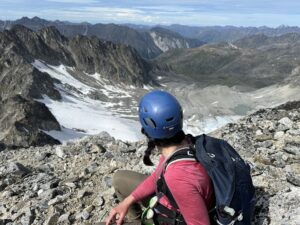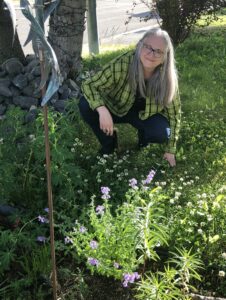
Some things always/never change: Alaska News Brief October 2024
By Teresa Clemmer, legal director
We’ve had an incredibly rainy summer—fifth wettest on record for Anchorage and similarly soggy across other regions of the state—but the fall weather I love in Alaska has finally started to shine through! I’ve been basking in the late-season sunshine and enjoying the long-awaited blue skies, the bursts of red and gold leaves, the juicy cranberries and blueberries, and even the familiar booming echoes as the hunters start sighting in their rifles. While my weekend was placid and relaxing, I know the birds, fish, and wildlife are in a frenzy, either getting ready to migrate far away or hunkering down for our long Alaskan winter.

Teresa’s pup Murphy enjoying the late-season sun!
It’s a period of transition for our team at Trustees for Alaska too. As we celebrate our 50th anniversary and finish up our fiscal year, we’ve been reflecting on our accomplishments and considering the challenges ahead. In each of our program areas, we’ve been managing not just individual lawsuits but clusters of cases, which require more effort and coordination with our clients and partners than usual.
One cluster includes the three cases we’re litigating in connection with our decades-long commitment to protecting the coastal plain of the Arctic National Wildlife Refuge from oil and gas development. In the first case, we are challenging the U.S. Bureau of Land Management’s approval of the Arctic Refuge leasing program. The litigation has been on hold while the bureau prepares a supplemental environmental review. We submitted extensive technical comments in that process, and we expect a final decision from the agency before the end of December.
The other two cases were initiated by the Alaska Industrial Development and Export Authority or AIDEA after the Interior Department suspended, and then cancelled, AIDEA’s oil and gas leases due to the legal flaws in the leasing program. We have intervened in both cases to defend Interior’s cancellation of leases on behalf of Alaska Native and conservation group clients.

Four lakes on the northwestern side of Teshekpuk Lake. Photo by Craig McCaa, BLM
Another cluster involves the five cases brought by the State of Alaska, industry, and pro-development groups challenging the bureau’s adoption of regulations strengthening protections for “special areas” in the western Arctic or the National Petroleum Reserve-Alaska (a region abundant with life and important to local people for millennia and named a “petroleum reserve” by the government in the 1900s). The new regulations provide a framework for the agency to expand and better protect wild places such as the Teshekpuk Lake special area, which serves as incredibly important habitat for migratory birds, caribou, and other wildlife. We’ve intervened in the litigation to help defend these important new regulations on behalf of multiple clients. We’ve also been working closely with clients and partners to put forth a science-backed proposal for implementing the new rules.
A third cluster consists of the three cases we are litigating to help defend the U.S. Environmental Protection Agency’s landmark decision protecting salmon in the Bristol Bay watershed from the harmful impacts of large-scale hardrock mining. The agency’s decision has been challenged by Pebble Limited Partnership, the State of Alaska, and two Alaska Native village corporations. We’ve intervened on behalf of twelve client organizations to help ensure that the protections for Bristol Bay remain in force and to make sure the agency retains its statutory authority under the Clean Water Act to adopt such protections.
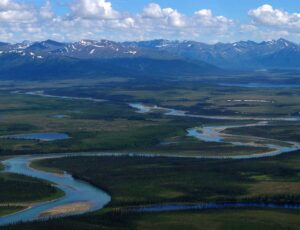
The Ambler River, east of Kobuk Valley NP. Photo by Mike Records, USGS via NPS
We are involved in major stand-alone lawsuits as well and, like so many others, these are in a period of flux. Our Ambler road litigation challenges multiple agency approvals for a project that would have devastating impacts on dozens of subsistence communities and the waterways, fish, caribou, and other resources they depend on. Through our litigation and other advocacy, we helped convince the U.S. Bureau of Land Management to rescind its approval for the Ambler road proposal, which was a huge victory! Our litigation remains on hold, however, because the U.S. Army Corps of Engineers and National Park Service have not yet revoked their parallel authorizations for the project. Recently, the Army Corps initiated a review process in accordance with its regulations that could lead to revocation.
We are also engaged in litigation challenging the National Park Service’s adoption of regulations in 2020 authorizing the baiting of brown bears, killing of bear cubs and wolf pups at or near their den sites, and other similarly destructive and dangerous practices to kill predator animals within national reserves across the state.
The park service adopted new regulations in 2024 that ban bear baiting and reaffirm the federal government’s authority to manage hunting within preserves in Alaska. The agency’s rule change will likely moot our existing litigation, but we expect new challenges to be brought by the State of Alaska and sport hunting groups. We remain committed to stopping these brutal hunting practices.
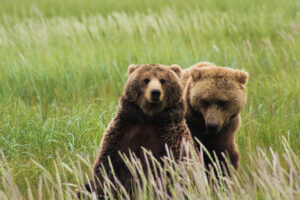
Brown bear pair in Lake Clark NP, Photo by Madison Grosvenor
We are ramping up our work protecting Alaska’s public lands on a broader scale as well. The U.S. Bureau of Land Management recently adopted new national regulations, known as the Conservation Rule, strengthening conservation-focused principles and guidelines for public land management across the country. Industry groups and pro-development states have challenged these rules in several places, including Alaska. On behalf of two Alaska-based conservation groups, we recently intervened to help defend the new rules, with a focus on responding to the Alaska National Interest Lands Conservation Act claims asserted by the State of Alaska. Additionally, the bureau recently decided to keep in place withdrawals protecting 28 million acres of public lands in Alaska from oil, gas, and mineral extraction, which were originally established under Section 17(d)(1) of the Alaska Native Claims Settlement Act. We submitted extensive comments during this process, and we are keeping an eye out for challenges from the State and industry groups.
Our advocacy work in agency decision making processes will continue in the coming year as well. We will be pushing for stronger protections for polar bears in “incidental take” authorizations (essentially pre-emptive “okays” for harming polar bears) associated with oil and gas operations on the North Slope. We are watching for a draft supplemental environmental impact statement relating to a proposed land exchange that would enable road construction across the Izembek National Wildlife Refuge, and we will be actively opposing any such exchange. We will be monitoring permitting and environmental review processes relating to the proposed West Susitna industrial access road and keeping an eye out for public comment opportunities. We will also be watching for opportunities to weigh in on proposed easements across Lake Clark National Park that would enable the development of the Johnson Tract Mine within the boundary of the national park.
We are so grateful to our supporters and cheering squads as we soon kick off our second 50 years in 2025 with this full docket of work to protect landscapes, communities, ways of life, and animals across the state.
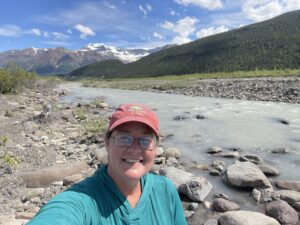
PS. Thanks to supporters like you, we can continue fighting to protect Alaska’s land, water, air, wildlife and people.
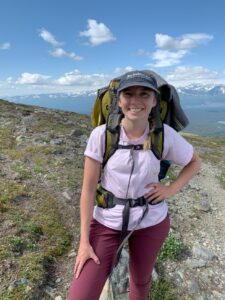
Celebrating Independence Day and her birthday by hiking the K’esugi Ridge Trail in Denali State Park with friends. Photo by Kaia Boonzaier



